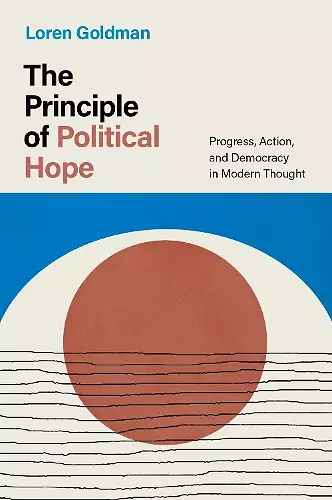The Principle of Political Hope
Progress, Action, and Democracy in Modern Thought
Format:Hardback
Publisher:Oxford University Press Inc
Published:23rd Feb '23
Should be back in stock very soon

A few years ago, the rhetoric of hope was all the rage, but the faith it expressed has been challenged by recent events and in recent political theory. Despite the regular appeal to hope from politicians, there is a widespread feeling of despair in the modern world: democracy is in retreat, it seems, and authoritarianism threatens both domestically and internationally. As a precondition for political action, the decline of political hope has special urgency in the context of democracy, an idea based on the egalitarian faith in the capacities of ordinary people to collectively manage their common affairs. What, if anything, can offer a foundation for hope in a democratic age? In The Principle of Political Hope, Loren Goldman draws on Immanuel Kant, Ernst Bloch, Charles Peirce, William James, and John Dewey to offer an account of political hope as a frame for navigating the relationship between subjective aspiration and objective possibility. Considering what political hope is, how it operates, how it has been thought about, and how to think about it in the contemporary world, Goldman's conceptualization of hope rejects grand notions of progress while still maintaining the possibility of a brighter future. This hope, as opposed to optimism, is characterized by uncertainty, haunted by the possibility of failure, and works to overcome despair. It is rooted in political action and democratic experimentation. Through an insightful reading of each thinker, Goldman shows that the anticipatory aspect of political thought allows us to make sense of political acts as prefigurative instead of merely expressive. Participation in voting, electoral politics, protest, aesthetic happenings, and even everyday minor acts of illegality are not merely activities serving instrumental ends-in-view but fleeting enactments of and preparation for a better future. Refreshing and lucid, Goldman reconstructs hope as a necessary condition for social and political engagement, reinvigorating the possibility of utopia in the process.
The Principle of Political Hope is an erudite, wide-ranging, and engaging study of the concept of political hope that puts German critical theory into productive conversation with American pragmatism. Differentiating hope from optimism and freeing it from the baggage of developmentalist readings of history, Goldman recuperates hope as a practical, political orientation, one that finds its fullest realization in democratic experimentation. * Amy Allen, author of Critique on the Couch: Why Critical Theory Needs Psychoanalysis *
An achingly beautiful book for our bleak times. Through rich and original readings of Kant, Bloch, and the American pragmatists, Goldman pries hope apart from temperament, attitude, and historiography to embed it in human action and experimentation. He insists that, for all our foibles and failures, we are the creatures who make the impossible possible in political life, and there hope resides. * Wendy Brown, author of Nihilistic Times: Thinking with Max Weber *
A spirited defense of democratic hope. Goldman's philosophical interlocutors-Kant, Bloch, Pierce, William James, and centrally John Dewey-bespeak surprising continuities between German idealism and American pragmatism. Kant's practical belief in moral and political progress, and the hope, predicated on action, in a more peaceful and equitable world, find apt exposition in this timely and important book. * Adam Potkay, author of Hope: A Literary History *
Loren Goldman's The Principle of Political Hope is a well-written and provocative book on the indispensability of hope, a conception of hope that simultaneously evades commitments to linear progress and tendencies to resort to political quietism. In lucidly written prose, Goldman builds on the insights and limits of a series of key modern thinkers-Kant's idea of progress, Bloch's concrete utopia, Dewey's democratic experimentalism-to argue for the radical potential for democratic action and change. In addition to bringing together authors across different philosophical traditions (crossing the continental/anglo-american divide), Goldman's book provides inspiration in these dark times. * Joseph Winters, author of Hope Draped in Black: Race, Melancholy, and the Agony of Progress *
This study may appeal largely to specialists, and its detailed scholarship and documentation may well satisfy them. * Choice *
Goldman's book offers innumerable contributions to contemporary political thought. He bridges between American pragmatism and German idealism; offers a rigorous analysis of Bloch's untranslated works; anchors hope within democratic theory; and defends Dewey against accusations of an individualistic account of political pragmatism. Goldman is generous with his readers by constructing his argument and analysis in eloquent prose, and by providing ample signposts to orient the reader within his work. This book is easily recommended to theorists and philosophers of democracy, pragmatism, and political hope. * Mary E. Witlacil, Contemporary Political Theory *
ISBN: 9780197675823
Dimensions: 161mm x 242mm x 22mm
Weight: 490g
248 pages